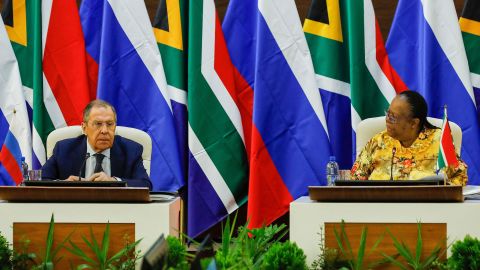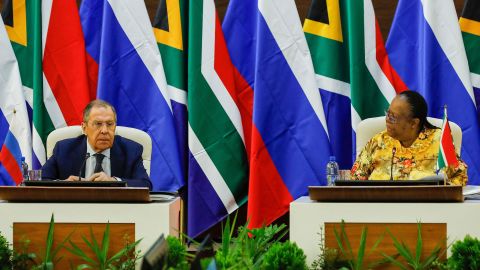Johannesburg, South Africa
CNN
—
As the anniversary of Vladimir Putin’s brutal invasion of Ukraine approaches, a Russian warship armed with one of Moscow’s most powerful weapons stopped at a port in Moscow over the weekend. the east coast of South Africa.
The Admiral Gorshkov frigate – carrying hypersonic Zircon missiles, according to President Putin – has a crudely painted white “Z” and “V” on its blackened funnel, just like the Russian tanks and artillery pieces that rolled in Ukraine a year ago.
He is taking part in a 10-day naval exercise in the Indian Ocean alongside South African and Chinese warships, war games that South Africa says are long overdue.
But the timing of the drills has left Western diplomats incensed privately and publicly critical, and they risk an embarrassing backlash for the government in Pretoria.
“The timing of these exercises is particularly unfortunate and will focus the world’s attention on South Africa on the anniversary of the war. I don’t think Western nations are going to let this one pass,” said Steven Gruzd, head of the African governance and diplomacy program at the South African Institute of International Affairs.
“It is very disturbing that South Africa is holding a military exercise with the country – an aggressor, an invader – using its military force against a peaceful country, sowing destruction and trying to eliminate the nation of Ukraine,” said Liubov Abravitova, Ukraine. Ambassador to Southern Africa.
On the basis of realpolitik alone, freezing Russia or, at the very least, postponing naval exercises, might have seemed like a smarter choice.
Ukraine’s biggest supporters, the United States and European Union countries, are also big trading partners for South Africa.
Bilateral trade between the European Union and the United States with South Africa goes far beyond Russian economic ties. And although Russia promises more trade deals, its struggling economy is unlikely to deliver the direct investment South Africa desperately needs.
South African officials also refer to exercises organized with French and American soldiers in recent years.
But the ties between South Africa’s ruling African National Congress (ANC) and Moscow run deep – and they are not easily severed.
“By default, we are on the side of Russia. And for us, Ukraine, what we call a clearance sale. It sells out to the west,” Obey Mabena, a veteran of the ANC’s military wing, said in an interview last year with CNN.
Although Mabena represents neither the government nor the ANC, his sentiment is likely shared by more than a small number of ANC stalwarts.
Mabena fled South Africa in the 1970s, like many of his generation, driven out by police brutality in apartheid South Africa. In exile, many young South Africans joined the armed wing of liberation movements like the ANC and the Pan Africanist Congress.
There were often Soviet advisers in their training camps in other African countries.
“We discovered that there was a country like the Soviet bloc that was ready to give us everything we needed. Give us food, they gave us uniforms, they trained us, they gave us given weapons,” Mabena said, “For the first time, we met white people who treated us as equals.
Liberation fighters and politicians have a very different experience with the West. The US government did not back comprehensive economic sanctions until the mid-1980s – decades after the apartheid regime came to power.
Anti-apartheid campaigner and South Africa’s first black president, Nelson Mandela was on a terror watch list until 2008 – a holdover from the Cold War. Many ANC members are convinced that the US Central Intelligence Agency (CIA) played a role in Mandela’s capture, which has never been proven.
Of course, many ANC cadres went to Ukraine during the Soviet era for their education and training.
And the anti-apartheid movement had some of its strongest allies in the United States. In Congress, then-senator Joe Biden lambasted Ronald Reagan’s secretary of state for supporting the white South African government.

In recent years, South Africa’s ties with Russia have only deepened with the formation of BRICS, the economic and diplomatic partnership of Brazil, Russia, India, China and from South Africa.
Withdrawing from the joint naval exercises would have been an insult to Russia, but probably also to China, a much more important economic partner.
South Africa’s top diplomat called some of the criticism of the naval drills a “double standard”.
Like several African nations, South Africa abstained in UN General Assembly votes to condemn the Russian invasion and annexation of Ukrainian territory.
“The answer we got is you can take it or leave it. And in the face of this arrogance, we thought the only decision we could make was to abstain,” Naledi Pandor, Minister of International Relations and Cooperation, told CNN in June.
She argues that the goal for the global community should be a negotiated settlement between Russia and Ukraine under the authority of the United Nations. South African President Cyril Ramaphosa has offered to mediate the talks.
Neither party accepted the offer. But South Africa’s stance on the war has barely frozen the country. US Secretary of State Antony Blinken, Treasury Secretary Janet Yellen and other senior US diplomats have all visited South Africa since the war began.
Perhaps aware of the history, senior US diplomats are careful not to criticize South Africa by name.
But if South African officials think their position is the pragmatic approach, it is difficult to say that it is the moral approach. Certainly with a pedigree of moral giants like Nelson Mandela and Desmond Tutu – the late Archbishop of Cape Town whose foundation said now was not the time to ‘sit on the fence’.
Pretoria could face even more criticism if, as rumor has it, Russia tests a Zircon hypersonic missile from the Admiral Gorshkov frigate during naval exercises.
Missiles are long-range weapons that travel more than five times the speed of sound and are harder to detect and intercept than other missiles.
Putin has already bragged about it. “It has no analogues in any country in the world,” he said, according to TASS. “I am sure that such powerful weapons will reliably protect Russia from potential external threats and help secure the national interests of our country,” he added.
Showing them off in joint drills could be another propaganda highlight for the Russian leader, whose weapons have fallen short of expectations in the war in Ukraine.
And by remaining steadfastly “neutral,” South Africa could hand Putin a significant victory on the war’s anniversary.
“They will milk this. Russia is going to use this as a propaganda tool and the message is ‘we have friends, we have cooperation’,” Gruzd said.
cnn
Don’t miss interesting posts on Famousbio










